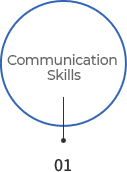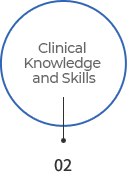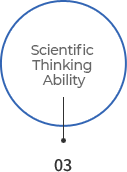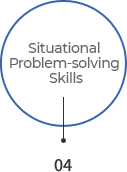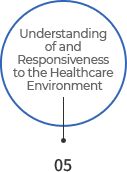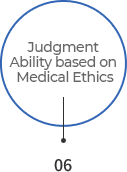Learning Outcomes by Period
| Learning Outcomes by Period | |||
|---|---|---|---|
| Outcomes | 1st Period (Pre-medical, 1st & 2nd year) | 2nd Period (Medical Dept., 1st & 2nd year) | 3rd Period (Medical Dept., 3rd & 4th year) |
| A. Medical professional with patient-centered communication | A1.1 Learn to respect others | A2.2 Learn basic knowledge about communication methods and attitude as a medical professional. | A3.1 Become able to respond appropriately emotionally and technically when conveying bad news. |
| A1.2 Listen to and empathize with others. | A2.2 Become able to lead a patient-centered conversation. | A3.2 Develop patience to listen to the patient to the end. | |
| A1.3 Become able to comprehend and arrange the core contents of the stories of others. | A2.3 Acquire the ability to convey my opinion in a way that the patient can understand. | A3.3 Become able to communicate smoothly with colleagues and medical professionals. | |
| A3.4 Acquire the ability to convey my opinion in a way that the patient can understand. | |||
| B. Medical professional providing optimal care | B1.2 Learn the basics of specialized medical subjects by studying basic science subjects. | B2.1 Repeatedly master the learning contents of basic medicine. | B3.1 Properly apply the latest knowledge of clinical medicine in patient care. |
| B1.2 Understand how basic medicine is applied to clinical medicine. | B2.2 Acquire the basic human eco-pathological, anatomical, and biochemical knowledge that is the basis of clinical practice. | B3.2 Refer to the medical guidelines for patient safety. | |
| B2.3 Understand how basic medicine is applied to clinical medicine. | B3.3 Become able to properly apply the learning contents of basic clinical medicine to actual patient care. | ||
| C. Medical professional with self-directed learning ability | C1.1 Think about why I want to become a doctor. | C2.1 Understand the learning goals of medicine and become a learning subject on my own. | C3.1 Have the flexibility to cope with future social changes. |
| C1.2 Understand the learning goals of the pre-med courses and become a learning subject on my own. | C2.2 Determine the medical field of interest and identify the necessary basic knowledge of the field. | C3.2 Recognize that I am the subject of learning and acquire self-directed problem-solving skills. | |
| C1.3 Understand the right image of the medical professional that society demands. | C2.3 Find solutions to medical problems. | C3.3 Learn the knowledge required in the clinical field by myself. | |
| D. Medical professional with creative research ability | D1.1 Broaden the scope of learning for a wide range of basic sciences and humanities, social sciences, and philosophy. | D2.1 Acquire basic knowledge about clinical research methods. | D3.1 Present research methodologies that can solve the problems derived from clinical treatment experiences for patients. |
| D1.2 Cultivate basic research ability to search for truth with scientific thinking and creativity | D2.2 Understand the methods of medical research. | D3.2 Understand the stages of clinical research, the points to be noted in each stage, and the process applied to clinical medicine. | |
| D1.3 Understand and become able to apply ethical aspects of medical research. | D2.3 Understand how animal testing research is related to medicine. | D3.3 Understand the process of applying medical statistics to medical research and understand the process of deriving clinical meaning. | |
| D2.4 Understand and become able to apply ethical aspects of medical research. | D3.4 Understand and become able to apply ethical aspects of medical research. | ||
| E. Medical professional with professional ethics | E1.1 Learn and practice social ethical norms. | E2.1 Understand the concept of medical professionalism and become able to list its components. | E3.1 Understand the relationship between doctors and patients and caregivers and be able to provide sufficient information correctly. |
| E1.2 Understand the basic principles of medical ethics. | E2.2 Become able to explain professional autonomy and social responsibility. | E3.2 Learn the concepts and precautions for ethical medical research. | |
| E2.3 Understand the reasons why ethical codes are necessary for medical professionals and become able to apply them. | E3.3 Acquire the ability to make ethical reasoning and effectively respond to various healthcare situations based on principles and guidelines. | ||
| F. Medical professional serving society | F1.1 Recognize that I am a member of society. | ||
| F1.2 Take the attitude of a medical professional who understands the suffering of individuals and society. | |||
| F1.3 Understand the social role of medical professionals, and become able to set the right image for medical professionals and practice them. | |||
| F1.4 Find the meaning of service in medical care and become able to find a way to practice it. | |||
| F1.5 Understand the impact of healthcare on society. | |||
| G. Medical professional collaborating with colleagues | G1.1 Become able to solve problems through cooperative learning among students. | G2.1 Become able to solve problems through cooperative learning among students. | G3.1 Develop the ability to solve problems through smooth communication and cooperation with colleagues as a member of the team. |
| G1.2 Learn how to cooperate to solve problems through implementing joint tasks. | G2.2 Learn how to cooperate to solve problems through implementing joint tasks. | G3.2 Understand the process of cooperating with experts in each field in medical care. | |
